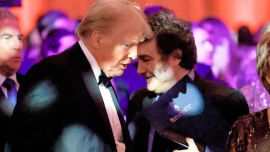The end of two decades of Lionel Messi in Barcelona and the Tokyo Olympics might steal the show in the present but the immediate future presents different challenges – “one moment in time … and the answers are all up to me” (words from the anthem for the Seoul Games in 1988) may hold true for athletes in Olympic arenas but life beyond is not so simple. Amid various long-term problems two timetables will take pride of place in the rest of this month – vaccinations against Covid-19 and the run-up to the September 12 PASO primaries, with these two urgencies far from unrelated.
The recent U-turns in vaccine strategy and diplomacy not only transcend the medical sphere but might well end up having more impact beyond – the intensified immunisation campaign which the government is hoping to turn into an electoral game-changer could end up as a toxic asset, given the persistent uncertainties of a pandemic which still seems far from over. The ideological concessions being made to tap the United States entry into global vaccine diplomacy during the last month could yet prove a question of “too little, too late” after so many months lost to the now abandoned blind faith in Russia’s Sputnik V vaccine in a world with increasing talk of the need for a third booster dose when only a sixth of the population here has received the second – nor is there even any guarantee against a US return to domestic priorities, given the steep uptick in coronavirus infection there.
Reference to US developments could be pertinent here as a warning against the danger of politicising this vital issue, as the recent flood of subliminal advertising showing a protective government immunising a grateful citizenry risks doing. In the United States political polarisation has resulted in the rapid vaccination of one half of the population being twice as slow in the other half, thus increasing vulnerability to the Delta strain. By seeking to identify with the ruling coalition a vaccination campaign reinforced this week by the addition of alternatives for the Sputnik second dose, the government risks jeopardising its success since the deep polarisation here could swell the small minority of vaccine sceptics.
Meanwhile the vaccination tail has ended up wagging the campaign dog because the change in strategy has seeped into an alteration of the government image all along the line. Starting with international relations – the U-turn over Pfizer vaccines looks like the prelude to a general rapprochement with Washington which could belie the previous opposition critique of an isolationist and autocratic government whose only friends abroad are Russia, China, Cuba, Venezuela and Nicaragua.
But the shift in image also ties in with a constant of Kirchnerite electoral strategy – presenting a moderate face during the campaign with the last elections in 2019 as the supreme example. Yet after repeated experiences since 2007 of moderation going into storage until the next elections, voters might finally be wising up to what you see not necessarily being what you get. Furthermore, the government faces social problems without precedent since the pre-Kirchnerite 2001-2002 meltdown – not for nothing has Daniel Arroyo been moved from heading the Social Development Ministry to a lowly 12th slot in the list of Frente de Todos candidates for Buenos Aires Province (a list in which 60 percent of the candidates likely to win seats are nominees of the Kirchner family, it might be added). Not that the widespread discontent is all Arroyo’s fault – even unrestrained public spending (boosted by several hundred billion pesos from this year’s budget) is little use against a persistent inflation corroding purchasing-power.
Such is the big picture but the appearance of black swans over the next month cannot be ruled out. For example, the social network buzz over the frequent visits of the model Sofía Pacchi to Olivos presidential residence seemed at the time total frivolity and the cheapest scandal-mongering, but she turns out to be linked to a Taiwanese businessman who makes his money out of security cameras, a universe dominated by Mario Montoto, the former treasurer of the Montonero guerrillas and father of ANSES social security administration chief Fernanda Raverta. If a week is a long time in politics, as the late British premier Harold Wilson said half a century ago, there are five more of them until the PASO primaries.


















Comments